Improving Learning: Gibbs Model, Feedback and Feed Forward
VerifiedAdded on 2023/06/12
|7
|2021
|82
Report
AI Summary
This report provides a reflective approach to learning in higher education, utilizing the Gibbs model to analyze personal strengths and weaknesses for enhanced future performance. It emphasizes the importance of reflection in teaching and learning, highlighting its role in improving the overall quality of educational practices. The report discusses the use of feedback and feed forward mechanisms to optimize learning outcomes, particularly in formative and summative assessments. The author reflects on their own learning experiences, identifying challenges such as time management and teamwork, and how the Gibbs model aided in recognizing areas for improvement. The report concludes that reflective assessment, combined with effective feedback strategies, is crucial for students to achieve higher results and develop best possible assignments.
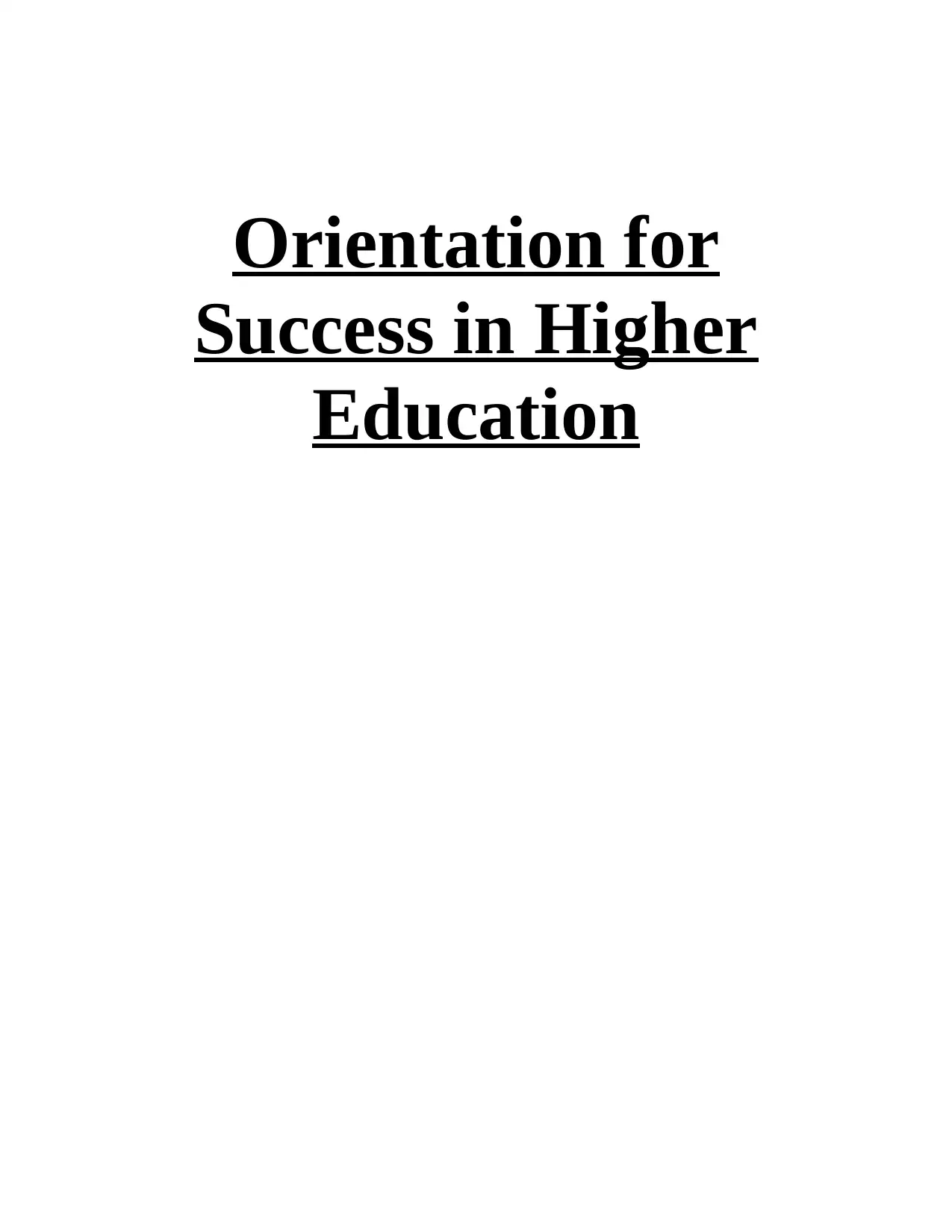
Orientation for
Success in Higher
Education
Success in Higher
Education
Paraphrase This Document
Need a fresh take? Get an instant paraphrase of this document with our AI Paraphraser
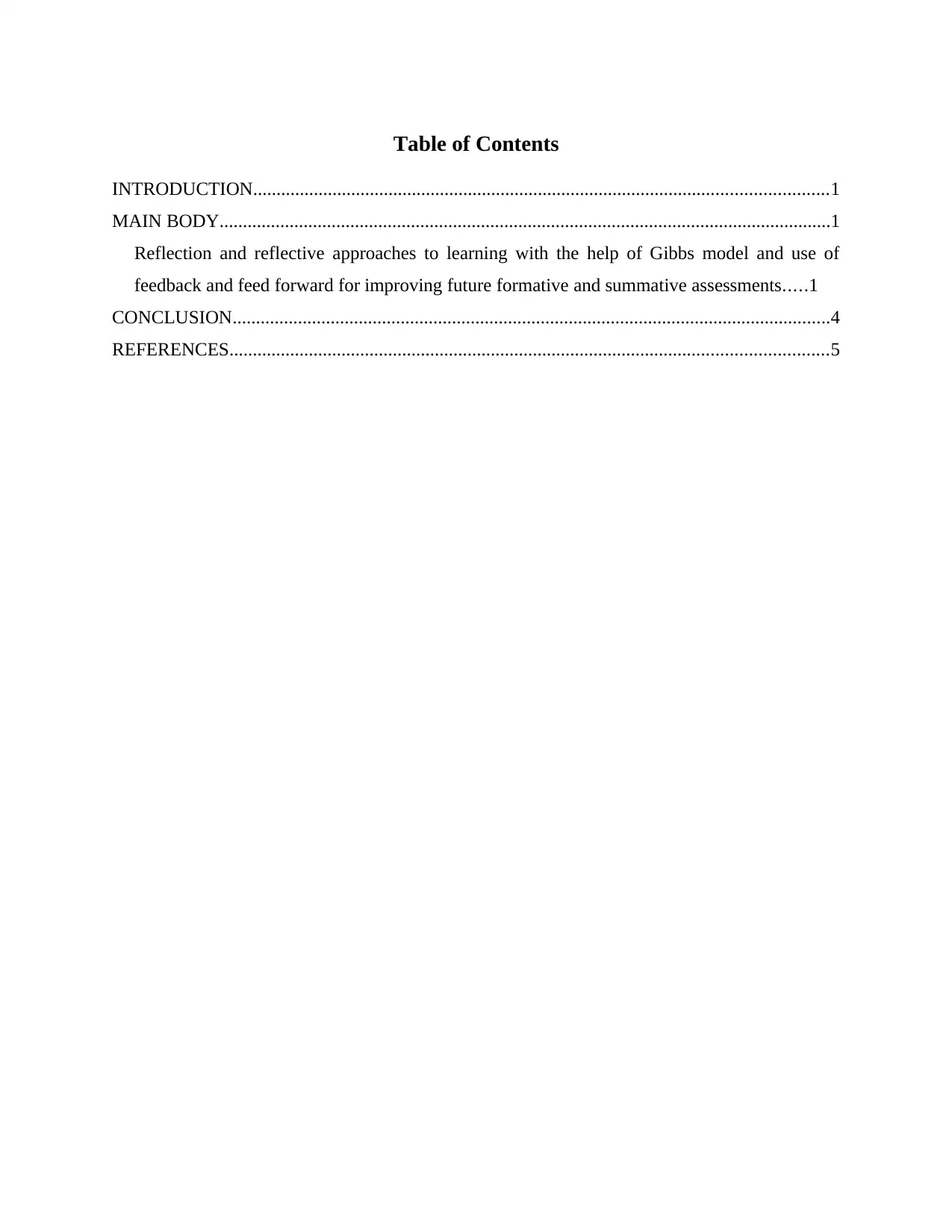
Table of Contents
INTRODUCTION...........................................................................................................................1
MAIN BODY...................................................................................................................................1
Reflection and reflective approaches to learning with the help of Gibbs model and use of
feedback and feed forward for improving future formative and summative assessments.....1
CONCLUSION................................................................................................................................4
REFERENCES................................................................................................................................5
INTRODUCTION...........................................................................................................................1
MAIN BODY...................................................................................................................................1
Reflection and reflective approaches to learning with the help of Gibbs model and use of
feedback and feed forward for improving future formative and summative assessments.....1
CONCLUSION................................................................................................................................4
REFERENCES................................................................................................................................5
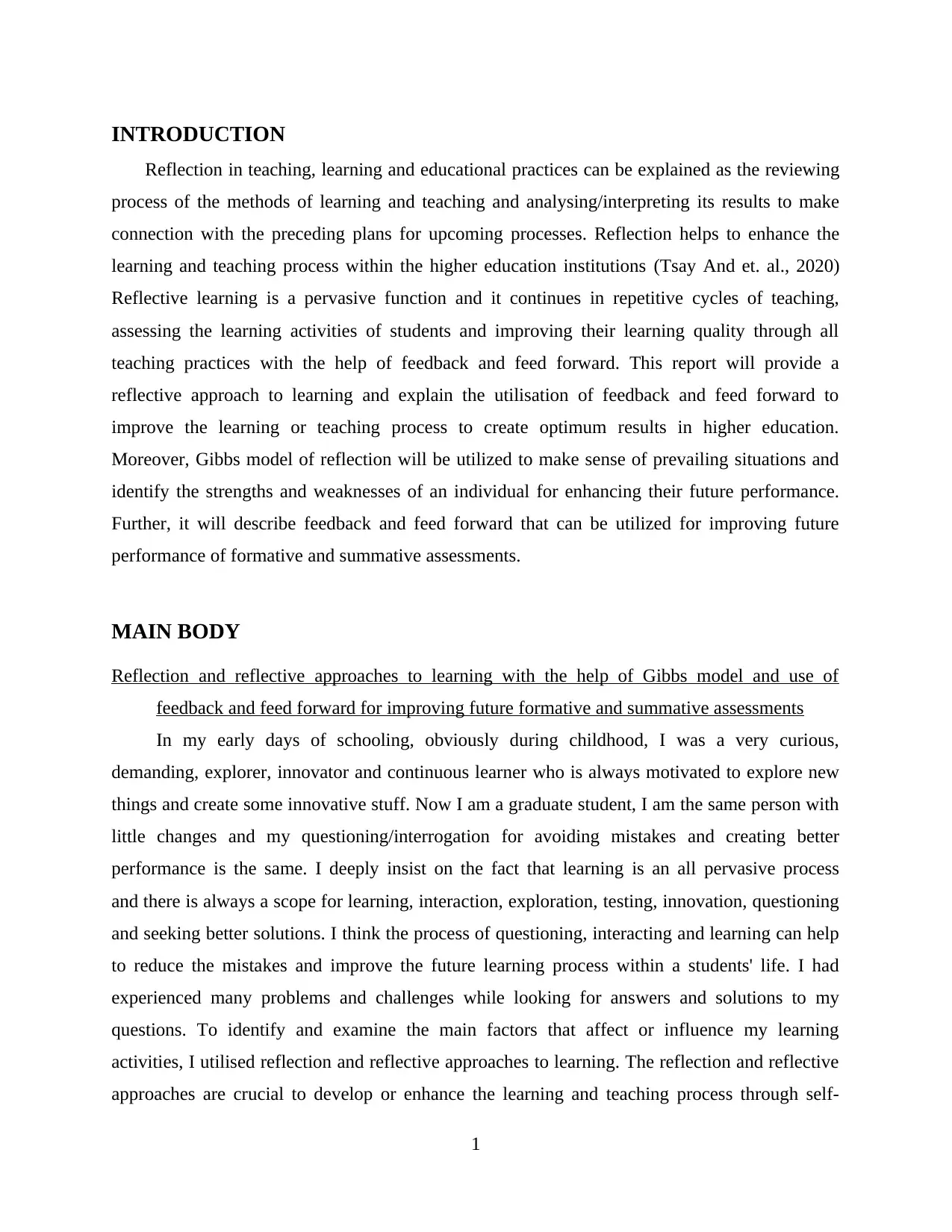
INTRODUCTION
Reflection in teaching, learning and educational practices can be explained as the reviewing
process of the methods of learning and teaching and analysing/interpreting its results to make
connection with the preceding plans for upcoming processes. Reflection helps to enhance the
learning and teaching process within the higher education institutions (Tsay And et. al., 2020)
Reflective learning is a pervasive function and it continues in repetitive cycles of teaching,
assessing the learning activities of students and improving their learning quality through all
teaching practices with the help of feedback and feed forward. This report will provide a
reflective approach to learning and explain the utilisation of feedback and feed forward to
improve the learning or teaching process to create optimum results in higher education.
Moreover, Gibbs model of reflection will be utilized to make sense of prevailing situations and
identify the strengths and weaknesses of an individual for enhancing their future performance.
Further, it will describe feedback and feed forward that can be utilized for improving future
performance of formative and summative assessments.
MAIN BODY
Reflection and reflective approaches to learning with the help of Gibbs model and use of
feedback and feed forward for improving future formative and summative assessments
In my early days of schooling, obviously during childhood, I was a very curious,
demanding, explorer, innovator and continuous learner who is always motivated to explore new
things and create some innovative stuff. Now I am a graduate student, I am the same person with
little changes and my questioning/interrogation for avoiding mistakes and creating better
performance is the same. I deeply insist on the fact that learning is an all pervasive process
and there is always a scope for learning, interaction, exploration, testing, innovation, questioning
and seeking better solutions. I think the process of questioning, interacting and learning can help
to reduce the mistakes and improve the future learning process within a students' life. I had
experienced many problems and challenges while looking for answers and solutions to my
questions. To identify and examine the main factors that affect or influence my learning
activities, I utilised reflection and reflective approaches to learning. The reflection and reflective
approaches are crucial to develop or enhance the learning and teaching process through self-
1
Reflection in teaching, learning and educational practices can be explained as the reviewing
process of the methods of learning and teaching and analysing/interpreting its results to make
connection with the preceding plans for upcoming processes. Reflection helps to enhance the
learning and teaching process within the higher education institutions (Tsay And et. al., 2020)
Reflective learning is a pervasive function and it continues in repetitive cycles of teaching,
assessing the learning activities of students and improving their learning quality through all
teaching practices with the help of feedback and feed forward. This report will provide a
reflective approach to learning and explain the utilisation of feedback and feed forward to
improve the learning or teaching process to create optimum results in higher education.
Moreover, Gibbs model of reflection will be utilized to make sense of prevailing situations and
identify the strengths and weaknesses of an individual for enhancing their future performance.
Further, it will describe feedback and feed forward that can be utilized for improving future
performance of formative and summative assessments.
MAIN BODY
Reflection and reflective approaches to learning with the help of Gibbs model and use of
feedback and feed forward for improving future formative and summative assessments
In my early days of schooling, obviously during childhood, I was a very curious,
demanding, explorer, innovator and continuous learner who is always motivated to explore new
things and create some innovative stuff. Now I am a graduate student, I am the same person with
little changes and my questioning/interrogation for avoiding mistakes and creating better
performance is the same. I deeply insist on the fact that learning is an all pervasive process
and there is always a scope for learning, interaction, exploration, testing, innovation, questioning
and seeking better solutions. I think the process of questioning, interacting and learning can help
to reduce the mistakes and improve the future learning process within a students' life. I had
experienced many problems and challenges while looking for answers and solutions to my
questions. To identify and examine the main factors that affect or influence my learning
activities, I utilised reflection and reflective approaches to learning. The reflection and reflective
approaches are crucial to develop or enhance the learning and teaching process through self-
1
⊘ This is a preview!⊘
Do you want full access?
Subscribe today to unlock all pages.

Trusted by 1+ million students worldwide
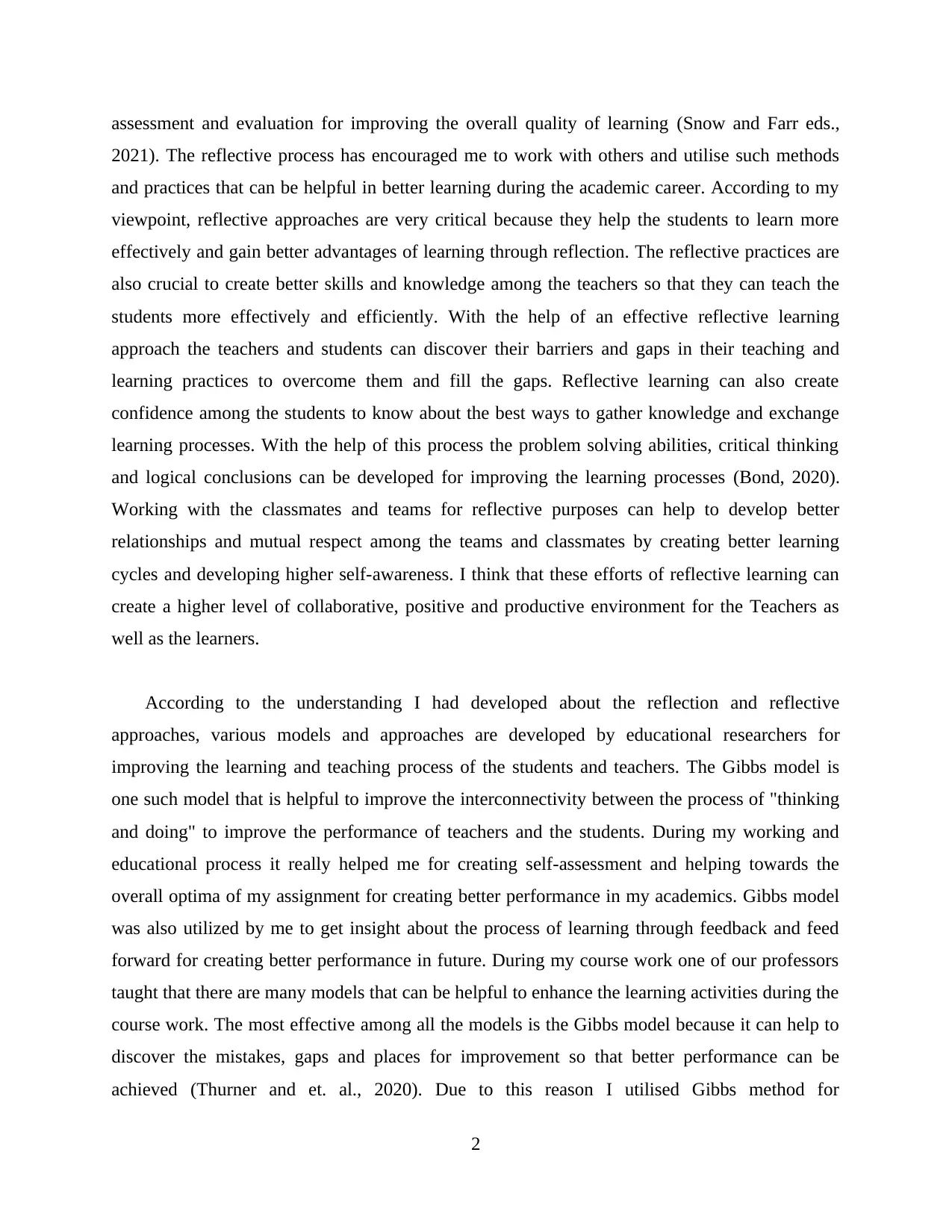
assessment and evaluation for improving the overall quality of learning (Snow and Farr eds.,
2021). The reflective process has encouraged me to work with others and utilise such methods
and practices that can be helpful in better learning during the academic career. According to my
viewpoint, reflective approaches are very critical because they help the students to learn more
effectively and gain better advantages of learning through reflection. The reflective practices are
also crucial to create better skills and knowledge among the teachers so that they can teach the
students more effectively and efficiently. With the help of an effective reflective learning
approach the teachers and students can discover their barriers and gaps in their teaching and
learning practices to overcome them and fill the gaps. Reflective learning can also create
confidence among the students to know about the best ways to gather knowledge and exchange
learning processes. With the help of this process the problem solving abilities, critical thinking
and logical conclusions can be developed for improving the learning processes (Bond, 2020).
Working with the classmates and teams for reflective purposes can help to develop better
relationships and mutual respect among the teams and classmates by creating better learning
cycles and developing higher self-awareness. I think that these efforts of reflective learning can
create a higher level of collaborative, positive and productive environment for the Teachers as
well as the learners.
According to the understanding I had developed about the reflection and reflective
approaches, various models and approaches are developed by educational researchers for
improving the learning and teaching process of the students and teachers. The Gibbs model is
one such model that is helpful to improve the interconnectivity between the process of "thinking
and doing" to improve the performance of teachers and the students. During my working and
educational process it really helped me for creating self-assessment and helping towards the
overall optima of my assignment for creating better performance in my academics. Gibbs model
was also utilized by me to get insight about the process of learning through feedback and feed
forward for creating better performance in future. During my course work one of our professors
taught that there are many models that can be helpful to enhance the learning activities during the
course work. The most effective among all the models is the Gibbs model because it can help to
discover the mistakes, gaps and places for improvement so that better performance can be
achieved (Thurner and et. al., 2020). Due to this reason I utilised Gibbs method for
2
2021). The reflective process has encouraged me to work with others and utilise such methods
and practices that can be helpful in better learning during the academic career. According to my
viewpoint, reflective approaches are very critical because they help the students to learn more
effectively and gain better advantages of learning through reflection. The reflective practices are
also crucial to create better skills and knowledge among the teachers so that they can teach the
students more effectively and efficiently. With the help of an effective reflective learning
approach the teachers and students can discover their barriers and gaps in their teaching and
learning practices to overcome them and fill the gaps. Reflective learning can also create
confidence among the students to know about the best ways to gather knowledge and exchange
learning processes. With the help of this process the problem solving abilities, critical thinking
and logical conclusions can be developed for improving the learning processes (Bond, 2020).
Working with the classmates and teams for reflective purposes can help to develop better
relationships and mutual respect among the teams and classmates by creating better learning
cycles and developing higher self-awareness. I think that these efforts of reflective learning can
create a higher level of collaborative, positive and productive environment for the Teachers as
well as the learners.
According to the understanding I had developed about the reflection and reflective
approaches, various models and approaches are developed by educational researchers for
improving the learning and teaching process of the students and teachers. The Gibbs model is
one such model that is helpful to improve the interconnectivity between the process of "thinking
and doing" to improve the performance of teachers and the students. During my working and
educational process it really helped me for creating self-assessment and helping towards the
overall optima of my assignment for creating better performance in my academics. Gibbs model
was also utilized by me to get insight about the process of learning through feedback and feed
forward for creating better performance in future. During my course work one of our professors
taught that there are many models that can be helpful to enhance the learning activities during the
course work. The most effective among all the models is the Gibbs model because it can help to
discover the mistakes, gaps and places for improvement so that better performance can be
achieved (Thurner and et. al., 2020). Due to this reason I utilised Gibbs method for
2
Paraphrase This Document
Need a fresh take? Get an instant paraphrase of this document with our AI Paraphraser
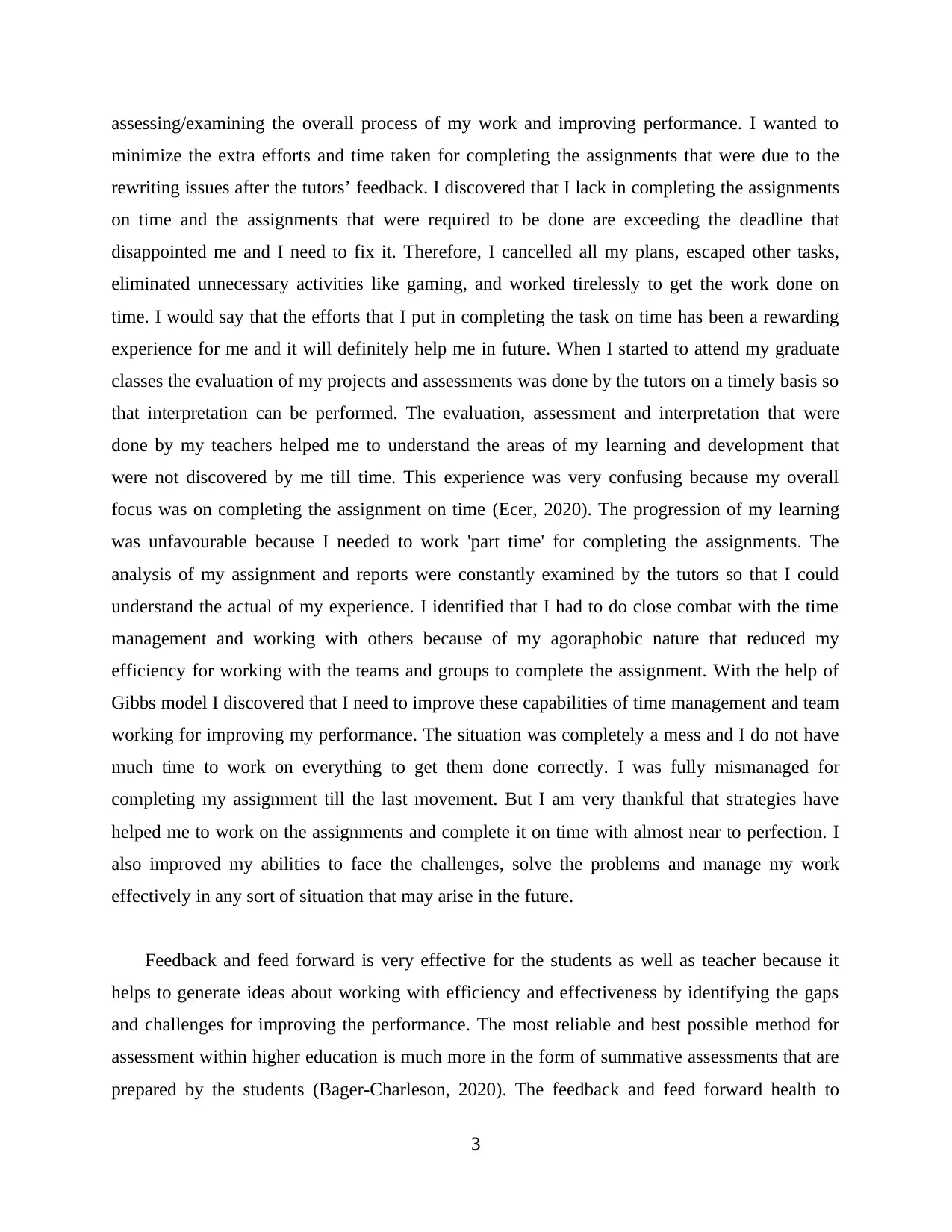
assessing/examining the overall process of my work and improving performance. I wanted to
minimize the extra efforts and time taken for completing the assignments that were due to the
rewriting issues after the tutors’ feedback. I discovered that I lack in completing the assignments
on time and the assignments that were required to be done are exceeding the deadline that
disappointed me and I need to fix it. Therefore, I cancelled all my plans, escaped other tasks,
eliminated unnecessary activities like gaming, and worked tirelessly to get the work done on
time. I would say that the efforts that I put in completing the task on time has been a rewarding
experience for me and it will definitely help me in future. When I started to attend my graduate
classes the evaluation of my projects and assessments was done by the tutors on a timely basis so
that interpretation can be performed. The evaluation, assessment and interpretation that were
done by my teachers helped me to understand the areas of my learning and development that
were not discovered by me till time. This experience was very confusing because my overall
focus was on completing the assignment on time (Ecer, 2020). The progression of my learning
was unfavourable because I needed to work 'part time' for completing the assignments. The
analysis of my assignment and reports were constantly examined by the tutors so that I could
understand the actual of my experience. I identified that I had to do close combat with the time
management and working with others because of my agoraphobic nature that reduced my
efficiency for working with the teams and groups to complete the assignment. With the help of
Gibbs model I discovered that I need to improve these capabilities of time management and team
working for improving my performance. The situation was completely a mess and I do not have
much time to work on everything to get them done correctly. I was fully mismanaged for
completing my assignment till the last movement. But I am very thankful that strategies have
helped me to work on the assignments and complete it on time with almost near to perfection. I
also improved my abilities to face the challenges, solve the problems and manage my work
effectively in any sort of situation that may arise in the future.
Feedback and feed forward is very effective for the students as well as teacher because it
helps to generate ideas about working with efficiency and effectiveness by identifying the gaps
and challenges for improving the performance. The most reliable and best possible method for
assessment within higher education is much more in the form of summative assessments that are
prepared by the students (Bager-Charleson, 2020). The feedback and feed forward health to
3
minimize the extra efforts and time taken for completing the assignments that were due to the
rewriting issues after the tutors’ feedback. I discovered that I lack in completing the assignments
on time and the assignments that were required to be done are exceeding the deadline that
disappointed me and I need to fix it. Therefore, I cancelled all my plans, escaped other tasks,
eliminated unnecessary activities like gaming, and worked tirelessly to get the work done on
time. I would say that the efforts that I put in completing the task on time has been a rewarding
experience for me and it will definitely help me in future. When I started to attend my graduate
classes the evaluation of my projects and assessments was done by the tutors on a timely basis so
that interpretation can be performed. The evaluation, assessment and interpretation that were
done by my teachers helped me to understand the areas of my learning and development that
were not discovered by me till time. This experience was very confusing because my overall
focus was on completing the assignment on time (Ecer, 2020). The progression of my learning
was unfavourable because I needed to work 'part time' for completing the assignments. The
analysis of my assignment and reports were constantly examined by the tutors so that I could
understand the actual of my experience. I identified that I had to do close combat with the time
management and working with others because of my agoraphobic nature that reduced my
efficiency for working with the teams and groups to complete the assignment. With the help of
Gibbs model I discovered that I need to improve these capabilities of time management and team
working for improving my performance. The situation was completely a mess and I do not have
much time to work on everything to get them done correctly. I was fully mismanaged for
completing my assignment till the last movement. But I am very thankful that strategies have
helped me to work on the assignments and complete it on time with almost near to perfection. I
also improved my abilities to face the challenges, solve the problems and manage my work
effectively in any sort of situation that may arise in the future.
Feedback and feed forward is very effective for the students as well as teacher because it
helps to generate ideas about working with efficiency and effectiveness by identifying the gaps
and challenges for improving the performance. The most reliable and best possible method for
assessment within higher education is much more in the form of summative assessments that are
prepared by the students (Bager-Charleson, 2020). The feedback and feed forward health to
3
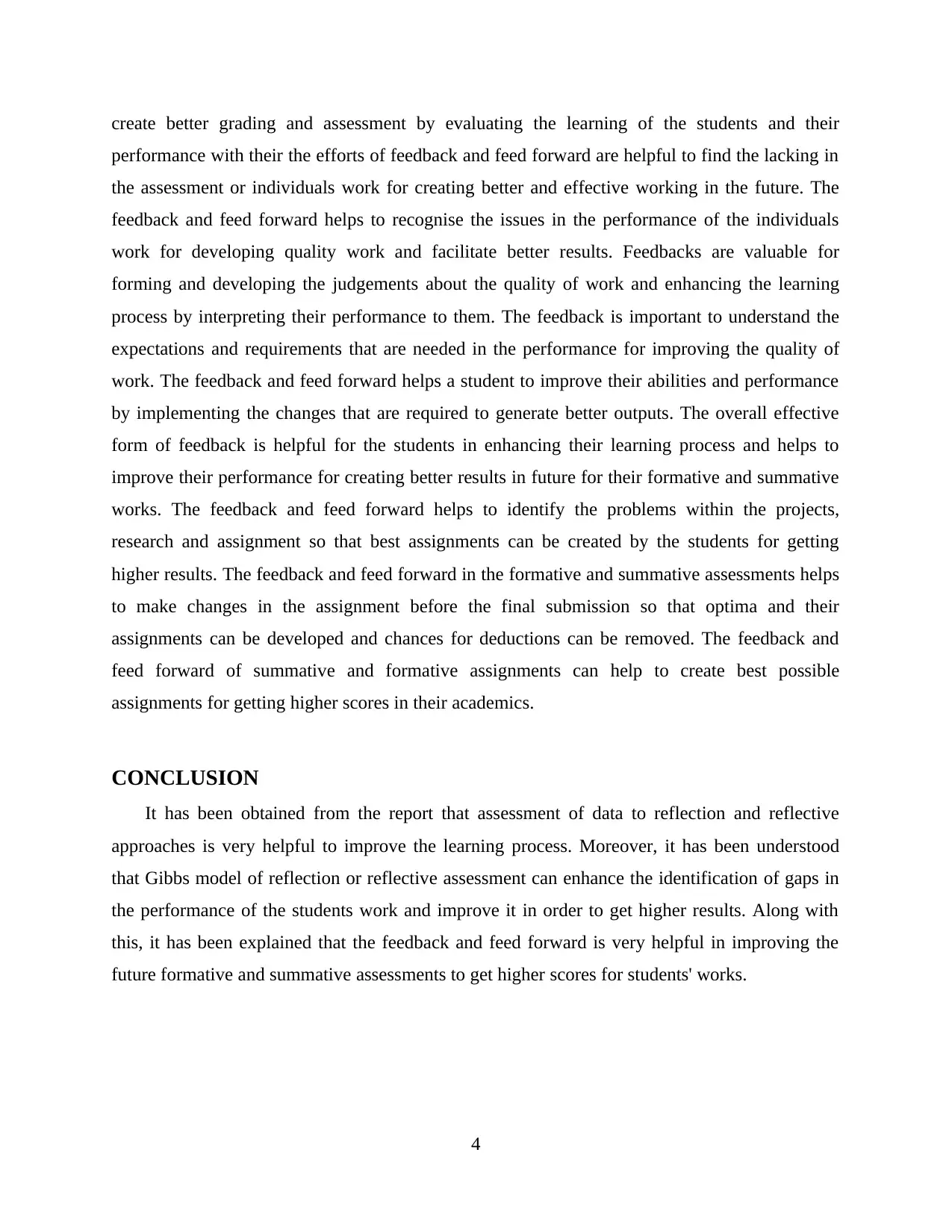
create better grading and assessment by evaluating the learning of the students and their
performance with their the efforts of feedback and feed forward are helpful to find the lacking in
the assessment or individuals work for creating better and effective working in the future. The
feedback and feed forward helps to recognise the issues in the performance of the individuals
work for developing quality work and facilitate better results. Feedbacks are valuable for
forming and developing the judgements about the quality of work and enhancing the learning
process by interpreting their performance to them. The feedback is important to understand the
expectations and requirements that are needed in the performance for improving the quality of
work. The feedback and feed forward helps a student to improve their abilities and performance
by implementing the changes that are required to generate better outputs. The overall effective
form of feedback is helpful for the students in enhancing their learning process and helps to
improve their performance for creating better results in future for their formative and summative
works. The feedback and feed forward helps to identify the problems within the projects,
research and assignment so that best assignments can be created by the students for getting
higher results. The feedback and feed forward in the formative and summative assessments helps
to make changes in the assignment before the final submission so that optima and their
assignments can be developed and chances for deductions can be removed. The feedback and
feed forward of summative and formative assignments can help to create best possible
assignments for getting higher scores in their academics.
CONCLUSION
It has been obtained from the report that assessment of data to reflection and reflective
approaches is very helpful to improve the learning process. Moreover, it has been understood
that Gibbs model of reflection or reflective assessment can enhance the identification of gaps in
the performance of the students work and improve it in order to get higher results. Along with
this, it has been explained that the feedback and feed forward is very helpful in improving the
future formative and summative assessments to get higher scores for students' works.
4
performance with their the efforts of feedback and feed forward are helpful to find the lacking in
the assessment or individuals work for creating better and effective working in the future. The
feedback and feed forward helps to recognise the issues in the performance of the individuals
work for developing quality work and facilitate better results. Feedbacks are valuable for
forming and developing the judgements about the quality of work and enhancing the learning
process by interpreting their performance to them. The feedback is important to understand the
expectations and requirements that are needed in the performance for improving the quality of
work. The feedback and feed forward helps a student to improve their abilities and performance
by implementing the changes that are required to generate better outputs. The overall effective
form of feedback is helpful for the students in enhancing their learning process and helps to
improve their performance for creating better results in future for their formative and summative
works. The feedback and feed forward helps to identify the problems within the projects,
research and assignment so that best assignments can be created by the students for getting
higher results. The feedback and feed forward in the formative and summative assessments helps
to make changes in the assignment before the final submission so that optima and their
assignments can be developed and chances for deductions can be removed. The feedback and
feed forward of summative and formative assignments can help to create best possible
assignments for getting higher scores in their academics.
CONCLUSION
It has been obtained from the report that assessment of data to reflection and reflective
approaches is very helpful to improve the learning process. Moreover, it has been understood
that Gibbs model of reflection or reflective assessment can enhance the identification of gaps in
the performance of the students work and improve it in order to get higher results. Along with
this, it has been explained that the feedback and feed forward is very helpful in improving the
future formative and summative assessments to get higher scores for students' works.
4
⊘ This is a preview!⊘
Do you want full access?
Subscribe today to unlock all pages.

Trusted by 1+ million students worldwide
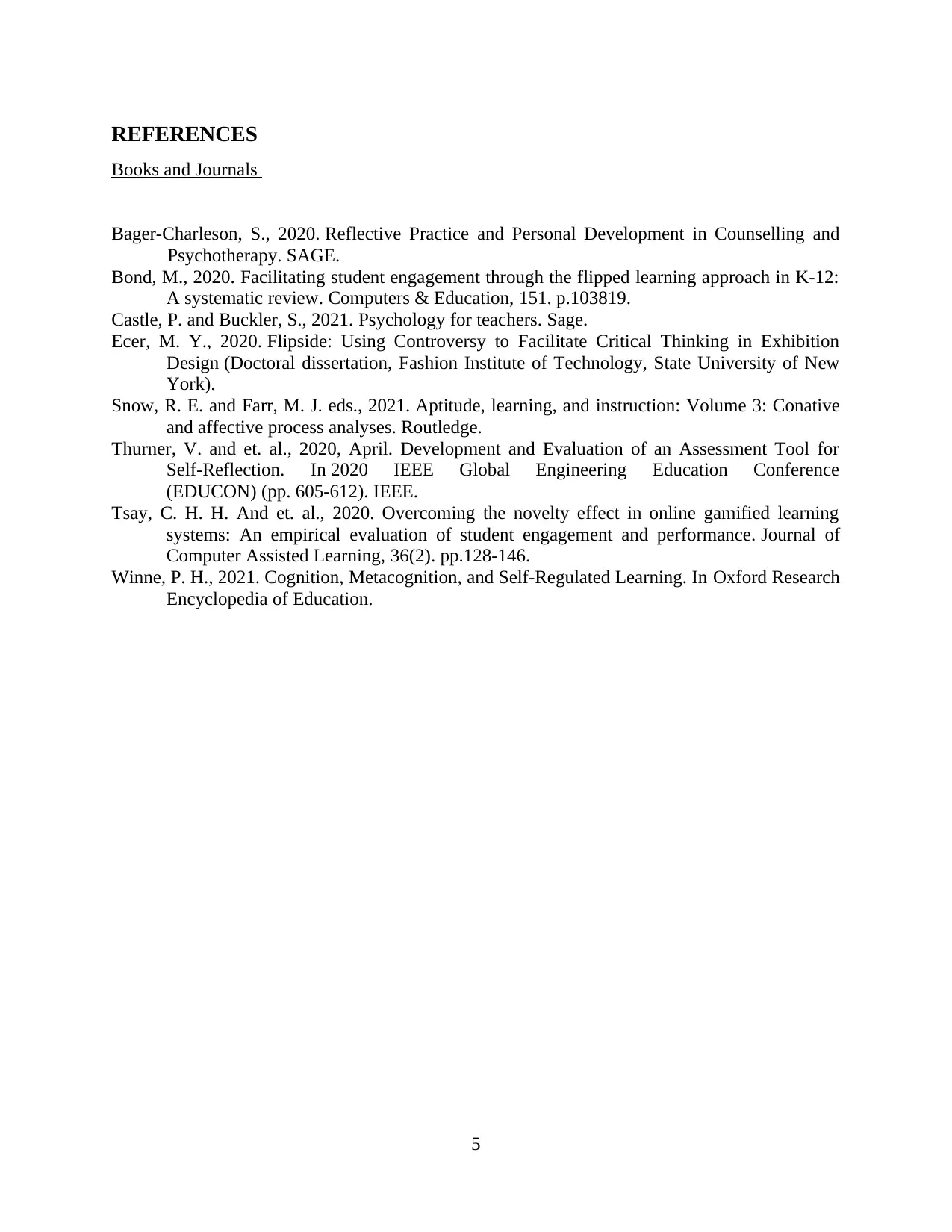
REFERENCES
Books and Journals
Bager-Charleson, S., 2020. Reflective Practice and Personal Development in Counselling and
Psychotherapy. SAGE.
Bond, M., 2020. Facilitating student engagement through the flipped learning approach in K-12:
A systematic review. Computers & Education, 151. p.103819.
Castle, P. and Buckler, S., 2021. Psychology for teachers. Sage.
Ecer, M. Y., 2020. Flipside: Using Controversy to Facilitate Critical Thinking in Exhibition
Design (Doctoral dissertation, Fashion Institute of Technology, State University of New
York).
Snow, R. E. and Farr, M. J. eds., 2021. Aptitude, learning, and instruction: Volume 3: Conative
and affective process analyses. Routledge.
Thurner, V. and et. al., 2020, April. Development and Evaluation of an Assessment Tool for
Self-Reflection. In 2020 IEEE Global Engineering Education Conference
(EDUCON) (pp. 605-612). IEEE.
Tsay, C. H. H. And et. al., 2020. Overcoming the novelty effect in online gamified learning
systems: An empirical evaluation of student engagement and performance. Journal of
Computer Assisted Learning, 36(2). pp.128-146.
Winne, P. H., 2021. Cognition, Metacognition, and Self-Regulated Learning. In Oxford Research
Encyclopedia of Education.
5
Books and Journals
Bager-Charleson, S., 2020. Reflective Practice and Personal Development in Counselling and
Psychotherapy. SAGE.
Bond, M., 2020. Facilitating student engagement through the flipped learning approach in K-12:
A systematic review. Computers & Education, 151. p.103819.
Castle, P. and Buckler, S., 2021. Psychology for teachers. Sage.
Ecer, M. Y., 2020. Flipside: Using Controversy to Facilitate Critical Thinking in Exhibition
Design (Doctoral dissertation, Fashion Institute of Technology, State University of New
York).
Snow, R. E. and Farr, M. J. eds., 2021. Aptitude, learning, and instruction: Volume 3: Conative
and affective process analyses. Routledge.
Thurner, V. and et. al., 2020, April. Development and Evaluation of an Assessment Tool for
Self-Reflection. In 2020 IEEE Global Engineering Education Conference
(EDUCON) (pp. 605-612). IEEE.
Tsay, C. H. H. And et. al., 2020. Overcoming the novelty effect in online gamified learning
systems: An empirical evaluation of student engagement and performance. Journal of
Computer Assisted Learning, 36(2). pp.128-146.
Winne, P. H., 2021. Cognition, Metacognition, and Self-Regulated Learning. In Oxford Research
Encyclopedia of Education.
5
1 out of 7
Related Documents
Your All-in-One AI-Powered Toolkit for Academic Success.
+13062052269
info@desklib.com
Available 24*7 on WhatsApp / Email
![[object Object]](/_next/static/media/star-bottom.7253800d.svg)
Unlock your academic potential
Copyright © 2020–2026 A2Z Services. All Rights Reserved. Developed and managed by ZUCOL.


